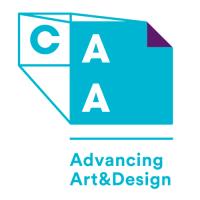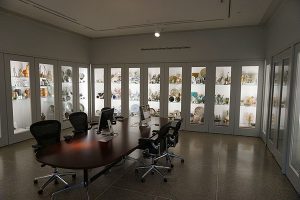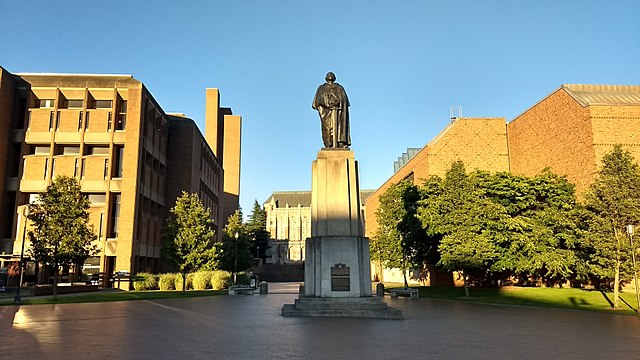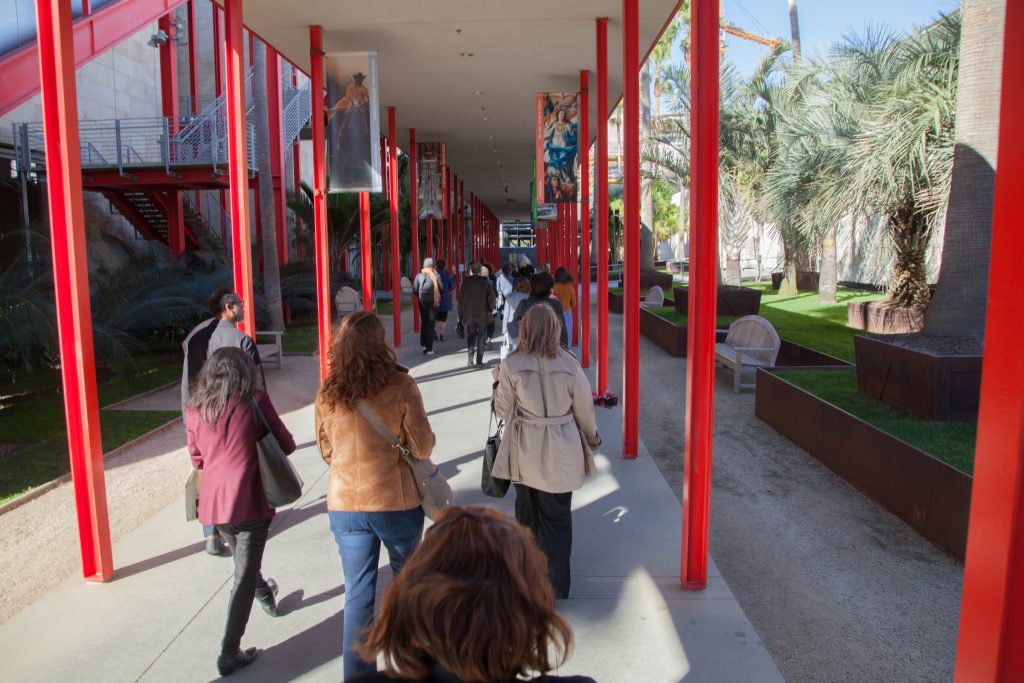CAA News Today
Recording now available–CAA Table Talk: Education and the Arts in a Time of Crisis
posted by CAA — October 05, 2020
Wednesday, October 14, 2020
12:00-12:30 PM (ET)
Free and open to the public
CLICK HERE TO JOIN THE CONVERSATION
We’re delighted to introduce CAA members to a new series of conversations between Meme Omogbai, our executive director and CEO, and N. Elizabeth Schlatter, the president of the CAA Board of Directors. Amidst so much change in our lives, workplaces, and world, join CAA leadership for an informal chat on how CAA is reshaping its efforts to provide access and resources where members need it most. Meme and Elizabeth will speak on the economic implications of COVID-19, the urgent importance of members’ scholarship, and the changing terrain of this cultural moment.
For best results, we recommend using the most up-to-date version of Chrome as your web browser. The conversation will be recorded and shared afterwards.
We would love to hear your questions, too. Please send them in advance to: caanews@collegeart.org
SPEAKER BIOGRAPHIES
Meme Omogbai is Executive Director and CEO of College Art Association (CAA). Before joining CAA, Omogbai served as a member and past Board Chair of the New Jersey Historic Trust, one of four landmark entities dedicated to preservation of the state’s historic and cultural heritage and Montclair State University’s Advisory Board. Named one of 25 Influential Black Women in Business by The Network Journal, Meme has over 25 years of experience in corporate, government, higher education, and museum sectors. As the first American of African descent to chair the American Alliance of Museums, Omogbai led an initiative to rebrand the AAM as a global, inclusive alliance. While COO and Trustee, she spearheaded a major transformation in operating performance at the Newark Museum. During her time as Deputy Assistant Chancellor of New Jersey’s Department of Higher Education, Omogbai received Legislative acknowledgement and was recognized with the New Jersey Meritorious Service Award for her work on college affordability initiatives for families. Omogbai received her MBA from Rutgers University and holds a CPA. She did post-graduate work at Harvard University’s Executive Management Program and has earned the designation of Chartered Global Management Accountant. She studied global museum executive leadership at the J. Paul Getty Trust Museum Leadership Institute, where she also served on the faculty.
N. Elizabeth Schlatter is the President of the CAA Board of Directors and Deputy Director and Curator of Exhibitions at the University of Richmond Museums, Virginia. A museum administrator, curator, and writer, she focuses on modern and contemporary art and on topics related to curating and issues specific to university museums. At UR, she has curated more than 20 exhibitions, including recent group exhibitions of contemporary art such as “Crooked Data: (Mis)Information in Contemporary Art,” “Anti-Grand: Contemporary Perspectives on Landscape,” and “Art=Text=Art: Works by Contemporary Artists.” She also serves on and chairs various University and School of Arts & Sciences committees. Prior to the University of Richmond, she worked with exhibitions at the Smithsonian Institution Traveling Exhibition Service (SITES) in Washington, D.C, and in fundraising at the Contemporary Arts Museum, Houston. She is author of Museum Careers: A Practical Guide for Novices and Students (Left Coast Press, Inc.) and a contributor to A Life in Museums: Managing Your Museum Career (American Association of Museums). She has a BA in art history from Southwestern University in Texas, and an MA in art history from George Washington University.
You’re Invited: Envisioning the Future of Higher Education in the Arts
posted by CAA — August 03, 2020
Tuesday, August 18, 2020
2 PM – 3:15 PM (ET)
RSVP HERE
Hosted by Art World Conference
Facilitator: Natalia Nakazawa, Artist, Arts Administrator, and Educator
Participants: Deborah Obalil, President and Executive Director of AICAD; Meme Omogbai, Executive Director and CEO of CAA
In 2020, colleges and universities across the world have rushed to adapt to a new reality that questions the very nature of their work: a pandemic sent students home and protests shone a spotlight on inequality supported by many of our institutions, including those in higher education. Since March, everyone involved in education has had to rethink fundamentals and challenge core assumptions ranging from the format of instruction to what and who creates value. Since arts education is historically vulnerable to funding cuts and much of the instruction relies on hands-on studio classes, specialized equipment, in-person mentorship, and tuition dollars, the systemic changes necessary to thrive require radical, ethical thinking. What are the responsibilities and priorities being considered going into this exceptional academic year?
Artist and educator Natalia Nakazawa will facilitate a discussion between two important leaders in arts education: Deborah Obalil, the President and Executive Director of the Association of Independent Colleges of Art and Design (AICAD), and Meme Omogbai, the Executive Director and CEO of the College Art Association (CAA). Both institutions support and advocate for artists, arts workers, and scholars in the art and design fields. Together, they will discuss the evolving paths forward for higher education in the arts, including structural changes and very significant challenges. What is the role of higher education in times of crisis? Since creativity is nurtured by the institutions they oversee, what are the creative solutions being implemented to address health concerns, anti-racism efforts, adjunct culture, and affordability? What are their hopes and expectations for the future?
This 75-minute webinar is designed with everyone in the art world from current students to artists, arts administrators, and art historians in mind. Questions submitted during registration will be incorporated into the discussion as appropriate.
PARTICIPANT BIOGRAPHIES
Natalia Nakazawa is a Queens-based interdisciplinary artist working across the mediums of painting, textiles, and social practice. Utilizing strategies drawn from a range of experiences in the fields of education, arts administration, and community activism, Nakazawa negotiates spaces between institutions and individuals, often inviting participation and collective imagining. She has held the position of Assistant Director of EFA Studios for over 8 years, supporting a large network of contemporary artists through subsidized studio spaces and professional practice opportunities in midtown Manhattan. Nakazawa received her MFA in studio practice from California College of the Arts, a MSEd from Queens College, and a BFA in painting from the Rhode Island School of Design. Her work has recently been exhibited at Wave Hill (Bronx, NY), Arlington Arts Center (Washington, DC), Transmitter Gallery (Brooklyn, NY), Wassaic Project (Wassaic, NY), The Old Stone House in Brooklyn (Brooklyn, NY), and The Metropolitan Museum of Art (New York, NY). Nakazawa has been an artist-in-residence at MASS MoCA, SPACE on Ryder Farm, The Children’s Museum of Manhattan, and Wassaic Project. She teaches at CUNY.
Deborah Obalil has over twenty years experience as a leader in the national arts and culture industry. She was appointed the Executive Director of the Association of Independent Colleges of Art & Design (AICAD) in June 2012, and then President in the fall 2015. Prior to her appointment with AICAD, Obalil operated a successful boutique arts management consulting firm, Obalil & Associates for four years. The firm provided consultation and facilitation in strategic business planning, marketing research and planning, and board development for non-profit arts organizations, independent artists of all disciplines, and creative for-profit ventures. Obalil has also served as Executive Director of the Alliance of Artists Communities and Director of Arts Marketing Center & Research at the Arts & Business Council of Chicago.
Meme Omogbai is Executive Director and CEO of College Art Association (CAA), the preeminent international support organization for professionals in the visual arts. Before joining CAA, Omogbai served as a member and past Board Chair of the New Jersey Historic Trust, one of four landmark entities dedicated to preservation of the state’s historic and cultural heritage and Montclair State University’s Advisory Board. Named one of 25 Influential Black Women in Business by The Network Journal, Meme has over 25 years of experience in corporate, government, higher education, and museum sectors. As the first American of African descent to chair the American Alliance of Museums, Omogbai led an initiative to rebrand the AAM as a global, inclusive alliance. While COO and Trustee, she spearheaded a major transformation in operating performance at the Newark Museum. During her time as Deputy Assistant Chancellor of New Jersey’s Department of Higher Education, Omogbai received Legislative acknowledgement and was recognized with the New Jersey Meritorious Service Award for her work on college affordability initiatives for families. Omogbai received her MBA from Rutgers University and holds a CPA. She did post-graduate work at Harvard University’s Executive Management Program and has earned the designation of Chartered Global Management Accountant. She studied global museum executive leadership at the J. Paul Getty Trust Museum Leadership Institute, where she also served on the faculty.
CAA Solidarity Statement
posted by CAA — June 05, 2020

The College Art Association (CAA) condemns all forms of systemic racism, violence, bias, aggression and the marginalization of Black, Indigenous, and all Peoples of Color (BIPOC) as well as discrimination based on race, intersectionality, ethnicity, and socioeconomic status. As a community of those who study, teach, write about, advocate for and/or create art and design, we have committed our life’s work to learning-from, exploring-with, and creating-towards our shared humanity. As a membership organization we choose to use our voices to speak to one another and speak up for one another.
To ensure lasting change:
- We encourage the creative community to examine biases, micro-aggressions, and who we leave out.
- We encourage learning from sharing narratives of BIPOC.
- We encourage providing services and support for underrepresented and entirely non-represented members of the community.
- We will work to create and promote standards and systems that actively support equity in anti-racist teaching, research, publication and creative practices.
In solidarity, CAA, its board, and its staff continue to amplify equity, diversity, and inclusion and call our community to action with us in this commitment to change.
CAA Values Statement on Diversity and Inclusion
For additional resources see the Committee on Diversity Practices as well as resources shared via CAA News, Twitter, Instagram, and Facebook.
CAA Statement on Firing of Graduate Student Strikers at UC Santa Cruz
posted by CAA — March 12, 2020

UCSC graduate students on strike, March 2020. Photo: Mat Weir, via GoodTimes
The CAA Advocacy Committee approved the following statement in March 2020.
CAA condemns the termination of employment for graduate student strikers at the University of California, Santa Cruz, calls for their reinstatement, and urges the university to commence negotiations with the students as soon as possible. This action has affected graduate students in the visual arts, which will impact their lives in serious ways, including the loss of medical insurance and residency status. We consider that their demands for an appropriate augmentation of salary in line with the increased costs of living are legitimate and note that they now have the support of the UAW, with whom the university is contracted.
Graduate students are indispensable workers who cannot be expected to execute their teaching duties and to pursue their own research when housing and food costs are not affordable with their current wages. CAA maintains that graduate students should be compensated at a level that makes it possible for them to flourish on campus as research assistants, teachers, and emerging scholars. A fair wage correlated with cost of living increases is a necessary precondition for their own work, essential to fulfilling the educational mandate of their departments, and essential for the dignity of all workers at the university. To punish students for exercising their rights to demand a decent wage is, in our view, unjust and unacceptable, and all penalties should be reversed immediately.
Further Reading
UC Graduate Students Threaten More Strikes as Movement Grows (Los Angeles Times)
Why We’re Striking for Fair Teaching Wages at UC Santa Cruz — Even With a Baby on the Way (Washington Post)
California University Fired 54 Grad Students Who Were Striking for Higher Pay (CNN)
Why Graduate Students at UC Santa Cruz Are Striking (New York Times)
CAA Standards and Guidelines for Part-Time Professional Employment (CAA)
A Letter to CAA Members from the History of Art Department at Yale University
posted by CAA — February 03, 2020
Dear Fellow CAA Members,
Last week CAA forwarded to its members an article from a student newspaper, the Yale Daily News, on the subject of introductory courses in the History of Art at Yale, without opportunity for comment from the Department. In the statement below my colleagues and I explain what is actually happening, as we move to offer Yale undergraduates a range of introductory courses that do justice to the diversity of our faculty’s research, of Yale’s collections and of the student body itself.
I work with a group of brilliant art historians who are constantly rethinking what we teach and how to teach it – our vision is expansive rather than reductive, in terms both of coverage and of art-historical methodology. It’s an interesting reflection on the current media ecology that the modest, incremental and generous changes being introduced to Yale’s curriculum could lead to an astonishing outburst of reactionary moral outrage online. Hyperbolic comparisons are rife: the ‘New York Post’ sees us as Visigoths poised to destroy Rome. We read of ‘Stalin at Yale.’ But Stalin murdered nine million people, while our Department is offering four, rather than two, 100-level courses. The parallel is imprecise, to say the least.
As all of us, across the profession, are exploring how to move forward, inspiring students to study the history of art and architecture. This is a matter of urgency in a world where critical visual skills have never been more important. We assert for our discipline a central role in a liberal arts education. Accordingly, plans are already afoot for a discussion around introductory art history teaching at the New York meeting of the Association in 2021. Visigoths will be welcome. I hope to see you there!
- Tim Barringer, Chair, Department of the History of Art, Yale University
The following statement has been approved by all members of the History of Art Department at Yale University:
For more than half a century, Yale’s History of Art Department has been dedicated to “the study of all forms of art, architecture, and visual culture in their social and historical contexts.” A particular strength of the Department’s teaching is close engagement with the great works from major world traditions held in the Yale University Art Gallery, where spectacular examples of European and American paintings and sculpture, prints, drawings and photographs sit alongside world class collections of Asian, African and the Indo-Pacific art. The Beinecke Library, Yale Center for British Art and Peabody Museum hold manuscripts, paintings, drawings and artefacts central to our field of study and teaching mission.
Art history is a global discipline. Yale faculty have made field-changing contributions to the study the arts of the Americas (notably Pre-Columbian art and the full range of North American art from colonial to contemporary), African art and arts of the African Diaspora, Asian and Islamic Arts, and European art from ancient times to today. The diversity of the Department’s faculty and our intellectual interests finds an analogue in the diversity of today’s student body.
Discussions in the Department have focused on how to ensure that this diversity of research and resources can inform and energize our teaching. Offerings at the undergraduate level include upper-level lecture courses that address a full range of subjects (such as ‘Greek Art and Architecture’, ‘African Arts and Expressive Cultures’, ‘American Photojournalism’ and ‘Introduction to Contemporary Art’). Small intensive seminars are more focused still (such as ‘Surrealism,’ ‘Japanese Screens’, and ‘The Global Museum’). We aim for the widest possible selection of courses, balanced across time and region, while we maintain and cherish intensive coverage of western art, from classical Greece to medieval, Renaissance and Baroque, nineteenth-century, modern and contemporary.
But what about survey courses, which aim to introduce a large body of students from across Yale to the History of Art? We have traditionally offered two survey courses. The first discusses the ancient Middle East, Egypt, and pre-Renaissance European art (HSAR 112). The second covers European and American art from the Renaissance to the present (HSAR 115). New introductory courses have been added to these two offerings, such as ‘Global Decorative Arts,’ ‘Arts of the Silk Road,’ ‘Global Sacred Art’ and ‘The Politics of Representation.’ Faculty members have designed these introductory courses to engage the wealth of objects in Yale’s collections but also to move across traditions and periods.
Beginning this past Fall 2019, the Department committed to offering four different introductory courses each year. All of these courses, current or future, are designed to introduce the undergraduate with no prior experience of the History of Art to art historical looking and thinking. They also range broadly in terms of geography and chronology. Essential to this decision is the Department’s belief that no one survey course taught in the space of a semester could ever be comprehensive, and that no one survey course can be taken as the definitive survey of our discipline.
As we continue to renew our curriculum while preserving our commitment to introductory teaching of the broadest scope, new courses will replace HSAR112 and 115. Some will engage with the monuments and masterpieces of European and American art, some will introduce other world traditions, and some will be organized thematically offering comparative perspectives. As always, our introductory classes will bring Yale students face to face with works of art and material objects of great beauty and cultural value from across time and place.
We remain as committed as ever to “the study of all forms of art, architecture, and visual culture” and to sharing insights into works of art, from the Parthenon sculptures to Benin bronzes, from Renaissance Florence to Aztec sculpture, from the Taj Mahal to performance and digital art. As life becomes increasingly dominated by the visual, through screens and lenses, Art History’s focus on critical visual analysis has never been more relevant. Recent excitement on social media about Yale’s curriculum demonstrates just how significant and lively – even controversial – the study of Art History can, and should, be. We are delighted to welcome large numbers of students to Art History classes at Yale now and in the future.
RAAMP Coffee Gathering: Differentiating Visual Arts Admin and Museum Studies Programs
posted by CAA — January 16, 2020
Coffee Gathering: Differentiating Visual Arts Administration and Museum Studies Programs
On Thursday, February 6 at 2pm (EST) we will be online with Bruce J. Altshuler, Director and Professor of Museum Studies at New York University and Sandra Lang, Director and Professor of Visual Arts Administration at New York University to discuss their respective programs. Joining them will be Visual Arts Administration student Laura Busby and Museum Studies student Olivia Knauss.
For participant bios, see the full post on RAAMP.
To join this Coffee Gathering, please email Cali Buckley at cbuckley@collegeart.org.
RAAMP Coffee Gatherings are monthly virtual chats aimed at giving participants an opportunity to informally discuss a topic that relates to their work as academic art museum professionals. Learn more here.
Submit to RAAMP
RAAMP (Resources for Academic Art Museum Professionals) aims to strengthen the educational mission of academic art museums by providing a publicly accessible repository of resources, online forums, and relevant news and information. Visit RAAMP to discover the newest resources and contribute.
RAAMP is a project of CAA with support from the Andrew W. Mellon Foundation and the Samuel H. Kress Foundation.
RAAMP Coffee Gathering: My Gallery Is Bigger Than Your Gallery
posted by CAA — November 13, 2019
Coffee Gathering: My Gallery Is Bigger Than Your Gallery
 On Thursday, November 21, 2019 at 2 PM (EST) RAAMP will be online with Michael Dickins, the curator and director of The New Gallery at Austin Peay State University. He will talk about the campus plan he created which enables him to share the gallery’s collection in the university’s community spaces.
On Thursday, November 21, 2019 at 2 PM (EST) RAAMP will be online with Michael Dickins, the curator and director of The New Gallery at Austin Peay State University. He will talk about the campus plan he created which enables him to share the gallery’s collection in the university’s community spaces.
“My formal gallery is 1500 sq. Ft,” writes Dickins. “My actual gallery is 186 acres of surrounding campus. I list my Gallery as my primary residence, but the rest of my campus is my second home, or better yet, a cultured land that includes some of my favorite vacationing spots.”
“I often use academic buildings, student common areas and the campus landscape to install works of art to not just boost the presence of the Department of Art+Design around campus, but as extensions of the gallery to educate students and the campus community about art and to generate conversations. These installations of artworks have bred collaboration between departments, administration and, more importantly, the facilities and grounds crews. They have also been excellent teaching opportunities for my students to learn about curating, installation, collaboration and managing red tape.”
To RSVP to this online coffee gathering, please email Olivia Knauss at oknauss@collegeart.org
RAAMP Coffee Gatherings are monthly virtual chats aimed at giving participants an opportunity to informally discuss a topic that relates to their work as academic art museum professionals. Learn more here.
Submit to RAAMP
RAAMP (Resources for Academic Art Museum Professionals) aims to strengthen the educational mission of academic art museums by providing a publicly accessible repository of resources, online forums, and relevant news and information. Visit RAAMP to discover the newest resources and contribute.
RAAMP is a project of CAA with support from The Andrew W. Mellon Foundation.
Now Accepting Applications for the Art History Fund for Travel to Special Exhibitions
posted by CAA — October 22, 2019
In August 2018, we announced that CAA had received a major anonymous gift to fund travel for art history faculty and their students to special exhibitions related to their classwork. After a successful inaugural year, we’re pleased to now be accepting applications for the second grant cycle of the Art History Fund for Travel to Special Exhibitions.
The fund is designed to award up to $10,000 to qualifying undergraduate and graduate art history classes to cover students’ and instructors’ costs (travel, accommodations, and admissions fees) associated with attending museum special exhibitions throughout the United States and worldwide. The purpose of the grants is to enhance students’ first-hand knowledge of original works of art.
Applications are due by January 15, 2020.
GUIDELINES
- These awards support student and instructor travel costs incurred while visiting museum special exhibitions in the United States and worldwide.
- Graduate and undergraduate art history classes are eligible to apply for funds to attend temporary museum exhibitions in the United States and other countries. Travel to see permanent collections is not eligible, nor would be performances and related ephemeral events. Exhibitions on any artist, period, or area of art history are eligible for funding.
- Awards are made directly to institutions whose institutional membership in CAA is in good standing.
- Applicant instructors must have individual membership in CAA and be in good standing.
- Funds may only be used to travel to exhibitions that correspond directly to the content of the class.
- The size of the class for which a grant may be awarded shall not be larger than fifteen (15) students.
- Awards may only be used for admission fees, travel and lodging expenses for the instructor and class members. Every attempt to attain group rates must be made.
Completed applications must include the following:
- Instructor’s curriculum vitae
- A course description and syllabus that identifies and explains the exhibition as part of the pedagogical aim of the course – Be sure to detail how the visit is integrated into the course (up to 500 words)
- An explanation of the instructor’s expertise in the subject matter of the exhibition (up to 250 words)
- A tentative itinerary of travel and lodging (up to 250 words)
- A budget detailing transportation and lodging expenses associated with traveling to and from the exhibition and lodging and admission costs, including an explanation of how any travel and accommodation funds in excess of the award will be raised
- A letter of support from the instructor’s department chair or dean
CRITERIA
- How well the exhibition fits within the pedagogical aim of the course.
- The scholarly merit of the exhibition.
- Financial need. Would the class not be able to visit the exhibition, otherwise?
AWARDS
Awards will not exceed $10,000 per class, per exhibition.
All travel must be completed between June 2020 – May 2021.
REPORTING
Awardees must submit a report of up to 1,000 words which explains in detail the benefits received and problems encountered in the course of travel to the exhibition for which support was received.
*Reports must be submitted to CAA no later than two months after the completion of travel.
ANNUAL CONFERENCE
Recipients of the award will be guaranteed a session at the subsequent CAA Annual Conference after their travel has ended. CAA will make the session available, but costs associated with attending the conference, including registration, membership, travel, and accommodation, will be the participants’ responsibility.
TIMELINE
The deadline for application materials is January 15.
RAAMP Coffee Gathering: Designing a Collection Plan
posted by CAA — October 16, 2019
RAAMP (Resources for Academic Art Museum Professionals) Coffee Gatherings are monthly virtual chats aimed at giving participants an opportunity to informally discuss a topic that relates to their work as academic art museum professionals.
Coffee Gathering: Designing a Collection Plan
On Tuesday, October 22 at 3 PM (EST), RAAMP’s online Coffee Gathering will focus on the process of creating collection plans in academic art museums. Through a series of questions, we will explore who should be involved in creating a collection plan, what information it should provide, and who it should serve. In discussing these topics, we hope to have related conversations about the challenges and opportunities creating a collection plan can provide staff and institutions.
This topic has emerged from the curious lack of publicly available collection plan examples. We hope to provide colleagues in academic art museums the opportunity to connect and share their experiences with writing collection plans.
Questions we will discuss include:
- What sections should be included?
- How does the collection plan integrate others, such as the university’s strategic plan, interpretive plan, and/or collections management policy?
- Who should be involved in creating the document?
- How might an academic art museum include their various communities in the process?
- With colleagues in your museums, how do you successfully have conversations on how to limit or focus a collection, especially at an encyclopedic museum?
- How might this document be helpful for donors?
- Do you share your collection plan publicly?
- How often do you revisit and revise your collection plan?
To RSVP to this online coffee gathering, please email Olivia Knauss at oknauss@collegeart.org
Submit to RAAMP

The Albertine Monroe-Brow study-storage gallery at the University of Michigan Museum of Art.
RAAMP (Resources for Academic Art Museum Professionals) aims to strengthen the educational mission of academic art museums by providing a publicly accessible repository of resources, online forums, and relevant news and information. Visit RAAMP to discover the newest resources and contribute.
RAAMP is a project of CAA with support from The Andrew W. Mellon Foundation.






